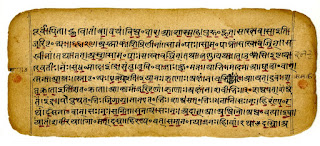Does Rigveda convey the speed of light?
In the commentary on the Rig Veda by Saayanacharya, a line translates as "Salutations to Sun-god who travels 2202 Yojanas in half a Nimisha". Some proponents interpret this to conclude that people during vedic age knew the accurate speed of light. We will now discuss the accuracy of this claim.
This is how they come to this surprising conclusion.
This is how they come to this surprising conclusion.
- First, they assume that one Yojana is 9 miles 110 yards. So the distance travelled by Sun is taken as 2202 Yojanas x (9 miles 110 yards) = 19,955 miles 1100 yards.
- Next, they assume one Nimisha is 16/75 seconds. So the time taken by Sun to cover this distance is 8/75 of a second.
- Thus they conclude that the velocity of light = Distance travelled by Sun / Time taken by Sun = 187,084 miles per second. This value is close to the modern value of 186,282 miles per second known through scientific experiments.
- First we must note that in the commentary, Saayanacharya talks about distance travelled by Sun and not light. So this is the first sleight of hand by these proponents in this modern reinterpretation of Rig Veda.
- Next, in the Rig Veda, there is no mention of Yojana or Nimisha anywhere. But it is only in the commentary many centuries later that these terms have been used. Then how can one even say that the speed of light was conveyed in the Rig Veda itself without talking about distance and time units?
- Further, one can note the hindsight bias in selection of values for Yojana and Nimisha (referred by the commentary) which had different values during different time periods [1]. For instance, Bhaskaracharya (1114 C.E.) conveys that the radius of Earth is 800 Yojanas. Given the modern value of 4000 miles for Earth's radius, it would make the value of 1 Yojana as 5 miles.
However, these proponents selected those values for Yojana and Nimisha that enabled them to obtain the speed of light as close to the modern scientific value as possible in an effort to push their agenda of vedic supremacy.
Reference:
[1] S Balachandra Rao, "Vedic Mathematics and Science in the Vedas", Navakarnataka publications. https://www.navakarnatakaonline.com/vedic-mathematics-and-science-in-vedas
[2] S Balachandra Rao, "Indian Mathematics & Astronomy Some Landmarks", Bharatiya Vidya Bhavan. https://www.navakarnatakaonline.com/indian-mathematics-and-astronomy
[2] S Balachandra Rao, "Indian Mathematics & Astronomy Some Landmarks", Bharatiya Vidya Bhavan. https://www.navakarnatakaonline.com/indian-mathematics-and-astronomy

Comments
Post a Comment